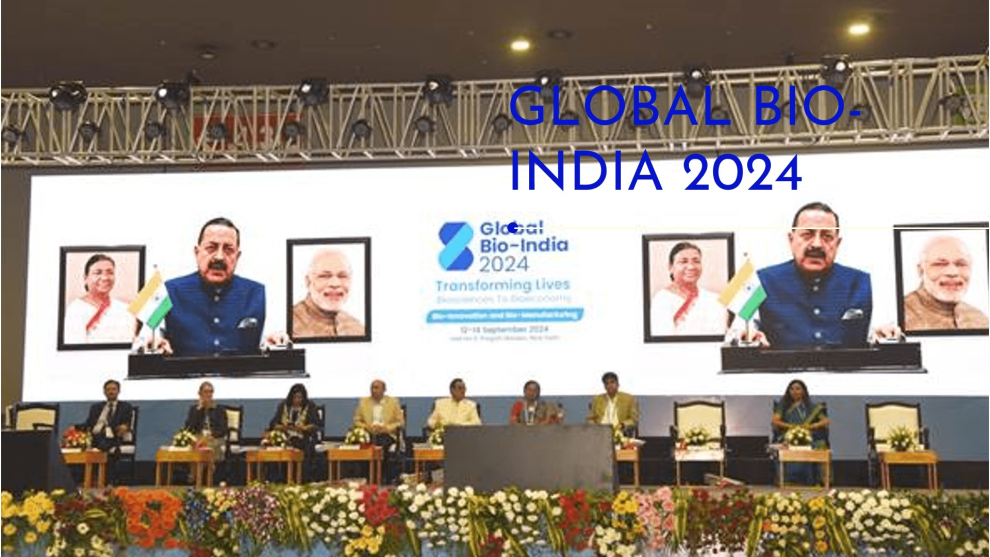The successful conclusion of Global Bio-India 2024 is a milestone in India’s biotech journey, not just in terms of innovation but as a showcase of India’s growing influence on the global biotech stage. The event, held from September 12th to 14th at Pragati Maidan, New Delhi, was more than just a gathering of the industry’s who’s who; it was a statement of intent by a nation ready to take its place at the forefront of biotechnology.
With the participation of over 30 countries, 500 exhibitors, 1000 startups, and a variety of stakeholders including research institutes, investors, policymakers, and international biotech leaders, Global Bio-India 2024 was India’s most significant biotechnology event to date. It served not only as a platform for showcasing innovations but also as a venue to initiate discussions on the future of biotechnology and its role in the country’s economic development.
Biotechnology: A Key Driver for India’s Future
In the past decade, India has emerged as a hub for biotech, thanks to a mix of policy support, entrepreneurial spirit, and talent. The nation’s bioeconomy has grown from $10 billion in 2014 to over $130 billion in 2024, with an ambitious target to reach $300 billion by 2030. This rapid growth, as highlighted by Dr. Jitendra Singh, Union Minister for Science and Technology, is a testament to India’s burgeoning biotech sector.
India’s success in biomanufacturing, particularly its 60% share in global vaccine production, has already made it a critical player in global healthcare. However, Global Bio-India 2024 was about more than past achievements. It was about setting the stage for future breakthroughs. The event demonstrated India’s readiness to play a leadership role in bio-agriculture, bio-energy, bio-industrial applications, and precision healthcare.
Startup Power: The Backbone of Biotech Growth
One of the most encouraging aspects of Global Bio-India 2024 was the prominent role played by startups. The event saw 11 new product launches by Indian biotech startups, underlining the innovative spirit driving this sector. These startups are not just catering to domestic needs but are also positioning themselves to solve global challenges through bioscience innovations. The support from the Department of Biotechnology (DBT) and BIRAC for these startups is critical. By creating a nurturing environment, these institutions are ensuring that Indian innovations can compete on the world stage.
However, this also brings to light the need for greater institutional support. As noted by Prof. V. Ramgopal Rao, institutions must do more to foster deep tech startups, especially those led by PhD holders and academic faculty. The fusion of academic research with industry needs can create groundbreaking products that address some of the most pressing global challenges, from climate change to healthcare.
Biotech for Economy, Employment, and Environment: The BioE3 Policy
The recently unveiled BioE3 (Biotechnology for Economy, Employment, and Environment) Policy adds another dimension to India’s biotech ambitions. This policy, approved by the Union Cabinet, aims to address the climate crisis, spur green innovation, and support sustainable economic growth. It’s a forward-thinking initiative that rightly positions biotechnology as a critical tool for tackling global environmental challenges.
India’s focus on bio-based solutions—such as biofuels, climate-resilient agriculture, and smart proteins—is a reflection of its desire to align economic growth with environmental responsibility. In doing so, the BioE3 Policy could help establish India as a sustainable biotech hub and a leader in the bio-revolution, much like it did with the IT revolution.
The Need for International Collaboration
The nine Letters of Intent signed by BIRAC with leading international organizations, including UK Research and Innovation and the United States Pharmacopeial Convention, point to the growing recognition of India as a biotech partner. These partnerships are essential not just for technology transfer and knowledge sharing but also for securing India’s place in global biotech value chains.
However, collaboration is a two-way street. As India invites the world to invest in its biotech landscape, it must also invest in global collaborations, fostering relationships that drive innovation while ensuring that India remains an integral part of the global biotech ecosystem.
Challenges and the Road Ahead
While Global Bio-India 2024 has set a high standard, challenges remain. Investment in research and development (R&D) continues to lag behind global peers, particularly in deep tech areas like nanotechnology and quantum biology. India also faces the challenge of scaling its biotech startups, ensuring that innovations developed within research labs translate into commercially viable products.
To achieve the $300 billion bioeconomy target, India will need to focus on improving its regulatory framework, ease of doing business, and funding opportunities for biotech startups. Additionally, the nation must address infrastructure gaps and ensure that tier-II and tier-III cities are integrated into the biotech revolution, promoting inclusive growth.
A Global Biotech Powerhouse by 2047?
As India celebrates its 100th year of independence in 2047, the dream of becoming a global biotech powerhouse seems more achievable than ever. The Global Bio-India 2024 has laid the foundation, but the road ahead is long. The event highlighted India’s potential but also the need for continuous effort, collaboration, and innovation.
India’s biotech sector is at an inflection point. With the right mix of policy support, global partnerships, and domestic innovation, the country has the potential to lead the global biotech revolution. It’s an exciting time for India’s bioeconomy, and as we look to the future, the vision of India@2047 as a biotechnology leader is not just a dream—it’s a fast-approaching reality.
Global Bio-India 2024 may have ended, but its ripple effect will be felt for years to come, as India steps confidently into its role as a biotech leader on the global stage.
Information Source: PIB.
___________________________________
For more insights on SME, Startups and Businesses and Socio-Politico News visit BharatiyaMedia.com. For editorial inquiries, email sharma.maayank@yahoo.com, and for advertisements and other enquiries, contact us at contact@entrepreneur.org.in.
Read more Startup Stories ….
Chai Sutta Bar: Revolutionizing Tea Culture with Passion and Purpose
Startup Funding Trends for 2024: Navigating the Path to Success












Add Comment